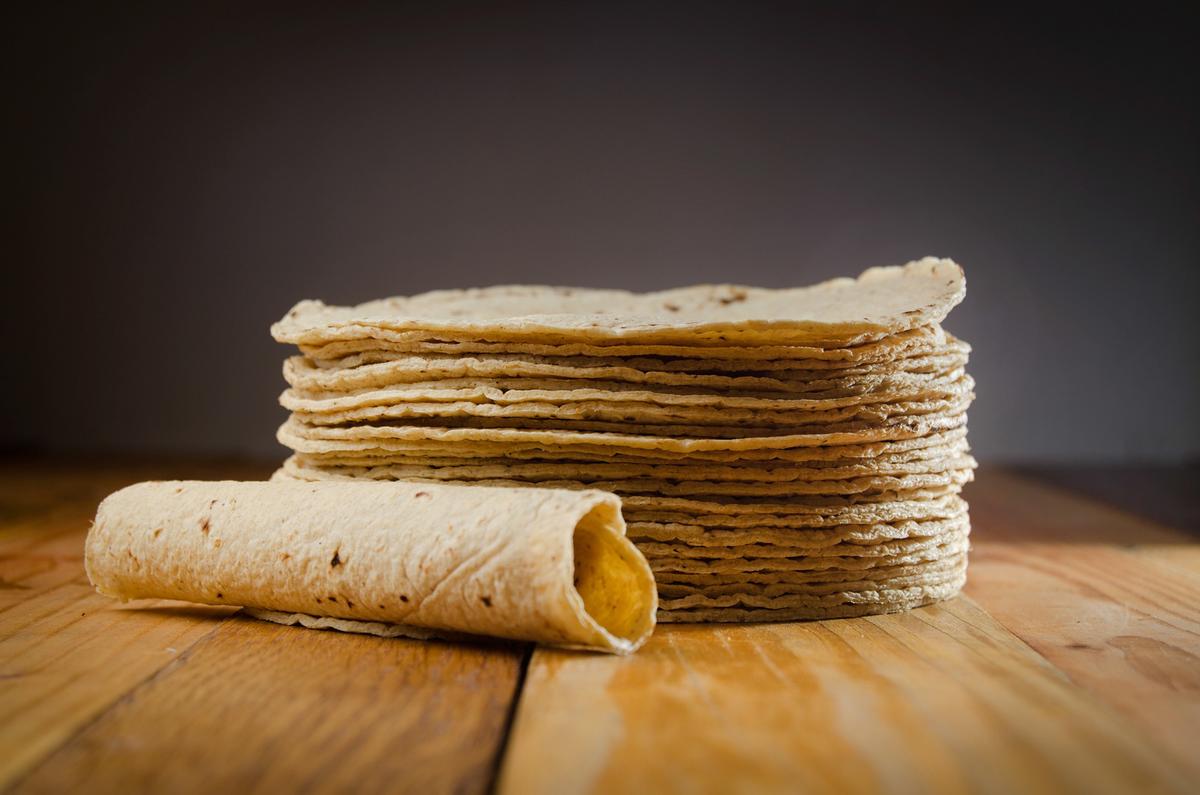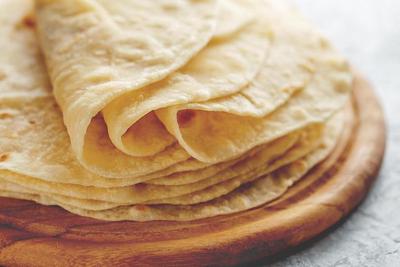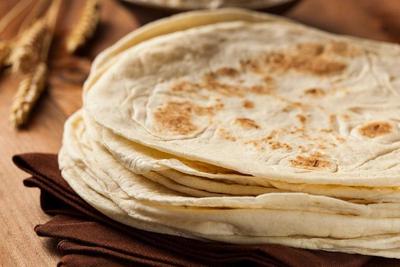🍞 Can Dogs Eat Tortillas? - Find Out Here
Well Tortillas surely are better than bread right? The truth may surprise you, we investigate 🔍

Summary
No, tortillas are not recommended for your dog, they contain many calories and can cause digestive issues. They also contain high amounts of fat which will contribute to your dog gaining weight. If you do decide to give these treats to your pet, please moderate their food intake, and don’t give to an overweight pup.
Ingredients
Well, they’re low in fat and high in fiber! But that’s where the good points end. What about the ingredients that go into making them? Here is an overview of some common ingredients found in most brands of commercial tortilla chips:
- Corn Oil
- Sodium Nitrate/Nitrite
- Potassium Bromate
- Monosodium Glutamate
- Hydrogenated Vegetable Stearates
- High Fructose Corn Syrup
- Dextrose Monohydrate
- Natural Flavorings
- Salt
- Paprika
- Cayenne Pepper
What about organic tortillas or wraps?
Organic tortillas may have fewer preservatives than their non-organic counterparts but still contain other questionable ingredients like hydrogenated vegetable oils and artificial flavors. If you want to feed your pet something healthy, look for natural foods made with real food such as chicken, turkey, beef, fish, eggs, fruits, vegetables, grains, beans, nuts, seeds, herbs & spices.
Tortilla ingredients - toxic to dogs?
The American Institute for Cancer Research states a 12 inch flour tortilla contain approximately 300 kcals, this can equal an entire small dogs calorie intake in one day, and more carbs than 3 slices of bread.

Wheat 🌾
The main ingredient in most commercial tortillas is wheat gluten. Wheat gluten contains proteins that cause inflammation when consumed by humans. It also causes intestinal damage in dogs. Wheat gluten has been linked to allergies, arthritis, cancer, diabetes, heart disease, obesity, skin problems, thyroid disorders, ulcers, and other conditions.
In addition to being toxic to dogs, wheat gluten is not digestible by many breeds. Some dogs cannot even tolerate it at all. This means that i
Nixtamalization
Tortillas begin with a process called nixtamalization . It involves cooking corn in an alkaline solution of calcium hydroxide, or limewater. Food-grade calcium hydroxide is generally safe. However, industrial-grade calcium hydroxide is not good for human or animal health. (sciencedirect.com)
Corn flour
Corn flour 🌽 is another major component of commercially available regular tortilla. The FDA states corn flour is used primarily as a thickening agent. There is no evidence that corn flour improves the nutritional value of any food. In fact, corn flour is often added to processed foods because it makes them thicker. The problem is that corn flour is highly refined and lacks nutrients for your pup.
Another commonly used additive in commercial tortillas is sodium nitrate. Sodium nitrate is used as a curing agent and color stabilizer. Although it doesn’t appear on labels, it is present in almost every packaged food we buy. When ingested, sodium nitrate converts to carcinogenic compounds called N-nitrosamines. These chemicals increase the risk of certain cancers including colon cancer.
Furthermore, sodium nitrite is an oxidizing compound found naturally in some meats. It’s used as a flavor enhancer and helps prevent bacterial growth during processing. Unfortunately, too much sodium nitrite can convert into dangerous substances. Studies show that high doses of sodium nitrite can lead to kidney failure, liver toxicity, and nerve degeneration, this is only after excessive long term consumption but we’d rather make our readers aware 🙋♀️.
Nixtamalization in tortillas
Tortilla is a type of flatbread made from corn dough. It can be prepared by hand or machine, and it has been used for centuries as the main food source for many people around the world. The process of making nixtamalized flour involves soaking dried maize kernels in an alkaline solution to soften them before grinding them into a meal. This step removes most of the starch granules that are responsible for the elasticity of wheat bread. After removing the outer layer of the kernel, the remaining inner portion becomes softer and easier to grind.
This method produces a higher yield of protein compared with whole grain flours. Because the endosperm remains intact, it provides additional nutrition.
When preparing nixtamalized products such as tortillas, care must be taken to avoid contamination with mold spores. If these molds grow in the presence of moisture, they produce mycotoxins which cause severe health issues. To ensure safety, store nixtamalized ingredients in airtight containers away from direct sunlight.
nixtamalized is dangerous for dogs The same concerns apply when using nixtamalized tortillas. They contain more than enough carbohydrates to feed a small pet. But since they lack fiber, they may contribute to weight gain. Also, like other types of white flour, nixtamalized contains little vitamin E and B vitamins. As a result, it could potentially harm your dog’s digestive system.
If you want to give your dog something healthy to chew on, try giving him homemade treats instead.
Additives
There are several ways to determine whether a particular brand of tortilla contains harmful additives. First, look for “gluten-free” or “no gluten” claims on packaging. Gluten is one of the primary proteins in wheat, so when manufacturers say their products don’t contain this, they’re referring to the protein itself. Products without gluten may still have other types of grains instead of wheat.
If you see words like “corn,” “maize,” or “wheat” anywhere near the ingredient list, then you should assume that the product contains those allergens. Look closely at the label; sometimes companies will add small quantities of common allergens to hide them under different names. For example, a company might call something containing soybeans “soya bean.”
You also want to check out the manufacturer’s website. Many websites offer information about specific brands of tortillas.

What kind of are tortillas made from?
Most commercially available tortillas are made from white corn. White corn contains less fiber and protein than yellow corn. Yellow corn is higher in nutrients and lower in calories.
Tortilla chips
Chips are often loaded with salt and fat. They aren’t very filling either because they lack complex carbohydrates. Instead, chips provide empty energy that your dog doesn’t need. In addition, eating large amounts of salty foods can make your dog more likely to develop heart disease later in life 🐕.
Corn variety ok?
Corn tortillas are not recommended for dogs due to the high levels of sodium found in commercial versions. However, if you prepare your own version yourself, you’ll know exactly what goes into each bite which is what we recommend if you choose to feed these as a treat.
Can dogs eat nacho cheese doritos?
Nacho cheese doritos are usually made with cheddar cheese. While some people think that all cheeses are safe for dogs, others believe that certain kinds pose risks. Cottage cheese has been linked to kidney stones in dogs. Other dairy items include milk, cream, butter, yoghurt, ice cream, sour cream, cottage cheese, kefir, ricotta cheese, and mozzarella cheese dogs can’t digest properly due to not being able to break lactose down.
Difference between wheat and rice flour?
Rice flour ones tend to be softer than wheat flour ones. That means they won’t last quite as long before getting soggy. On top of that, rice flour tends to absorb water faster than wheat flour does. So even though they start off soft, they end up hard after just a few minutes.
Conclusion
In conclusion, we don’t recommend tortillas for your dogs, whether that’s chips or tortilla wraps. Due to harmful ingredients, they can cause a variety of issues and health risks for your dog, from upset stomachs to weight gain. These should be noted as human food only, dogs simply don’t have the digestion system or calorie requirement to justifying eating these. It won’t hurt your dog as a one-off, but shouldn’t be given on a regular basis.